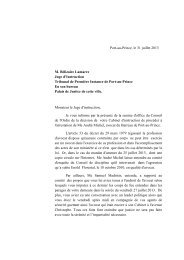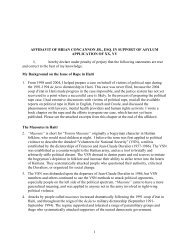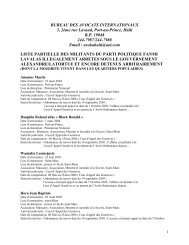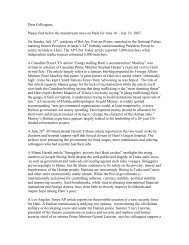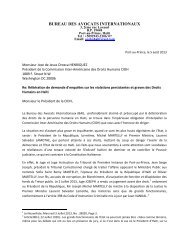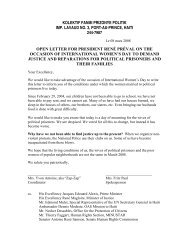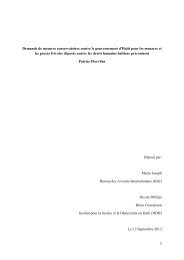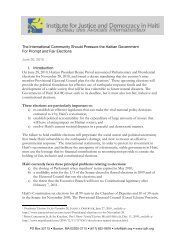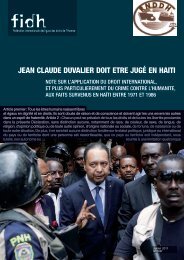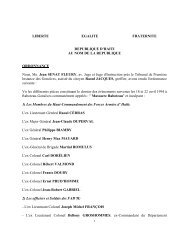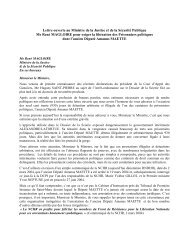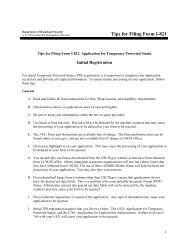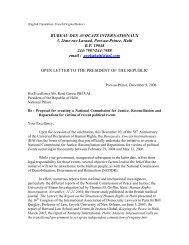Peacekeeping without Accountability - Yale Law School
Peacekeeping without Accountability - Yale Law School
Peacekeeping without Accountability - Yale Law School
- No tags were found...
You also want an ePaper? Increase the reach of your titles
YUMPU automatically turns print PDFs into web optimized ePapers that Google loves.
esponse to the epidemic has been underfundedand incomplete.In the years following the outbreak, the U.N.has denied responsibility for the epidemic. TheU.N. has repeatedly relied on a 2011 study by a U.N.Independent Panel of Experts, which concludedthat at the time there was no clear scientificconsensus regarding the cause of the epidemic.However, these experts have since revised theirinitial conclusions. In a recent statement, theyunequivocally stated that new scientific evidencedoes point to MINUSTAH troops as the cause of theoutbreak. As Chapter II of this report establishes,epidemiological studies of the outbreak linkingthe outbreak to the MINUSTAH base in Méyèbelie the U.N.’s claims. Four key findings confirmthat MINUSTAH peacekeeping troops introducedcholera into the country. First, doctors observedno active transmission of symptomatic cholera inHaiti prior to the arrival of the MINUSTAH troopsfrom Nepal. Second, the area initially affectedby the epidemic encompassed the location ofthe MINUSTAH base. Third, the troops at theMINUSTAH base were exposed to cholera in Nepal,and their feces contaminated the water supplynear the base. Finally, the outbreak in Haiti istraceable to a single South Asian cholera strainfrom Nepal. No compelling alternative hypothesisof the epidemic’s origins has been proposed.As Chapter III details, in refusing to provide aforum to address the grievances of victims of thecholera epidemic, despite clear scientific evidencetracing the epidemic to the MINUSTAH camp’sinadequate waste infrastructure, the U.N. violatesits obligations under international law. According tothe U.N. Charter and the Convention on Privilegesand Immunities of the U.N., the U.N. is immunefrom suit in most national and internationaljurisdictions. Because of this legal immunity,the U.N. must provide to third parties certainmechanisms for holding it accountable if and whenit engages in wrongdoing during peacekeepingoperations—an obligation the U.N. Secretary-General has publicly recognized. In a series ofreports submitted to the General Assembly in thelate 1990s, the Secretary-General explained thatthe U.N. has an international responsibility for theactivities of U.N. peacekeepers. This responsibilityincludes liability for damage caused by peacekeepersduring the performance of their duties.The U.N. historically has addressed the scopeof its liability in peacekeeping operations throughStatus of Forces Agreements (SOFAs) signed withhost countries. The Haitian government signedsuch an agreement with MINUSTAH in 2004. Inthis SOFA, the U.N. explicitly promises to create astanding commission to review third party claimsof a private law character—meaning claims relatedto torts or contracts—arising from peacekeepingoperations. Despite its obligations under the SOFA,the U.N. has not established a claims commission inHaiti. In fact, the U.N. has promised similar claimscommissions in over 30 SOFAs since 1990. To date,however, the organization has not established asingle commission, leaving countless victims ofpeacekeeper wrongdoing <strong>without</strong> any remedy at law.The U.N.’s refusal to establish a claims commissionnot only violates the terms of its own contractualagreement with Haiti; it also defies the organization’sresponsibilities under international humanrights law. As Chapter IV explains, the U.N.’s foundingdocuments require that the U.N. respect internationallaw, including international human rightslaw, and promote global respect for human rights. Inaddition, the SOFA requires that MINUSTAH observeall local laws, which include Haiti’s obligations toits citizens under international human rights law.International human rights law guarantees accessto clean water and the prevention and treatment ofinfectious disease, forbids arbitrary deprivation oflife, and ensures that when a person’s human rightsare not respected, he or she may seek reparation forthat harm. By failing to prevent MINUSTAH fromintroducing cholera into a major Haitian watersystem and subsequently denying any remedy to thevictims of the epidemic it caused, the U.N. failed torespect its victims’ human rights to water, health,life, and an effective remedy. Furthermore, giventhe U.N.’s role as a leader in the development, promotion,and protection of international human rightslaw, it risks losing its moral ground by refusing tocomply with the very law it demands states andother international actors respect.The U.N.’s role in introducing cholera into Haitiis particularly troubling given the humanitarianrole that MINUSTAH has played in Haiti. AsChapter V explains, through its conduct thatled to the cholera epidemic in Haiti, MINUSTAH3 executive summary



